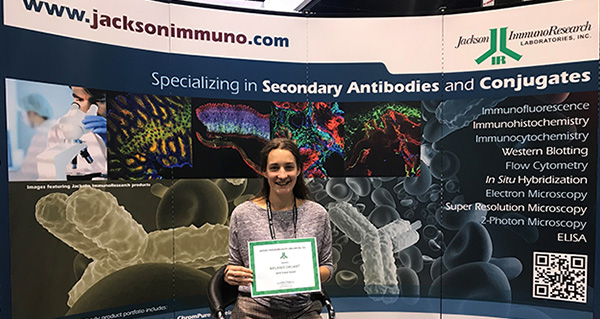
Congratulations to the recipient of Jackson ImmunoResearch’s €1000 travel grant for SfN2019!
Jackson ImmunoResearch offers travel funding to support researchers attending academic meetings and conferences.
JIR invited applications from attendees of SfN 2019 in Chicago to receive a travel award of €1000 to be used against costs incurred to attend the meeting.
The Society for Neuroscience conference attracts over 22,000 delegates from all over the world. SfN is the highlight of the neuroscience calendar, showcasing the latest research and enabling extensive networking,
Find more information about SfN conferences here
Travel grant winner SfN 2019
The winner of our SfN travel grant is Melanie Druart from INSERM Institut du Fer à Moulin in Paris, France. Find out a little more about her SfN experience and her research below.

Melanie Druart is based in Paris, France. Her PhD project looked at deciphering the molecular and synaptic changes that occur at excitatory inputs onto PV interneurons.
Attending 2019 SFN meeting
“Attending the 2019 SFN meeting, thanks to the JacksonImmunoResearch travel grant, was a great career opportunity, since it allowed me to give international visibility to my work. It has also been a really exciting experience, as I attended for the first time a scientific meeting of this size and scope. Furthermore, I had the chance to present my research project by presenting a poster and discussing with various colleagues and eminent scientists of my field. After receiving insightful feedback and comments on my project, I came back to the lab with novel and interesting ideas to investigate, allowing me to make progress towards the writing of a manuscript and the completion of my PhD thesis.”
“Finally, participating to the SFN meeting gave me the opportunity to expand my network and meet researchers that may welcome me as a prospective postdoctoral fellow.”
Research Summary
“My research focuses on synaptic plasticity during a critical period of brain development. Critical periods are defined as specific time windows during which neural networks are highly plastic in response to environmental perturbations. A specific critical period has been well characterized in the developing visual cortex in which permanent changes in ocular dominance occur after monocular deprivation during that critical period. Converging evidence implicates glutamatergic inputs onto parvalbumin-expressing (PV) interneurons in the onset of the CP for OD plasticity. However, the underlying molecular and synaptic mechanisms remain largely unknown.”
“My PhD project aims at deciphering molecular and synaptic changes that occur at excitatory inputs onto PV interneurons. Using patch-clamp recordings in acute mouse brain slices at different developmental stages, as well as immunochemistry and array tomography, we found a transient modification in AMPA receptor subunit composition specifically in PV interneurons during the critical period. We also observed a loss of homeostatic plasticity at these synapses. We hypothesized that the scaffolding protein GRIP1 is responsible for these changes since GRIP1 is downregulated in PV interneurons during the critical period. We generated mice with selective ablation of GRIP1 in PV interneurons and demonstrated that the depletion of GRIP1 is sufficient to extend the synaptic changes observed during the critical period to adulthood.”
Publications
Join our mailing list for an update on JIR’s upcoming 2020 travel grants for selected conferences.
| Learn more: | Do more: |
|---|---|
| Direct and indirect Western blotting | Exhibition schedule |
| Choosing your secondary antibody | NIR conjugates for Western Blotting |
| Colorimetric Western blotting | Cite and win! |


